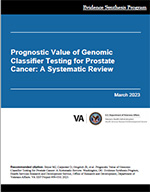
|
Recommended citation: |
Download PDF: Complete Report, Executive Summary, Report, Appendices
Genomic classifier tests for prostate cancer may offer some additional prognostic benefit over existing clinically based risk schemas and may be helpful when management decisions are uncertain. Definitive evidence of the prognostic ability of these tests is still needed from current management-era data and measured by limited long-term clinical outcomes relevant to patients.
Prostate cancer is the most common malignancy in men. A major challenge for prostate cancer management is tailoring the intensity of treatment to personalized risk. Risk stratification is generally based on clinical features; however, multiple options exist for treatment, and there is variability in patient outcomes not explained by currently recognized risk factors. Commercially available, tissue-based genomic classifier tests offer the potential to provide more accurate risk assessments for patients with localized prostate cancer.
We identified 55 studies evaluating the impact of three genomic classifier tests (eg, Decipher, Oncotype, and Prolaris) on prostate cancer risk reclassification, treatment recommendations, and clinical outcomes. Results showed a wide range of impacts on risk reclassification with no clear pattern. Receipt of a genomic classifier test tends to spur a change in management recommendations in observational studies, but not in the 1 available randomized trial. The tests provided modest additional prognostic information over existing clinical risk prediction schemas, but the certainty of evidence was low to very low across key outcomes (ie, biochemical recurrence, metastases, prostate-cancer specific mortality) based on concerns related to the era from which the data were drawn, imprecision of the estimates, and inconsistency of findings. Decipher had the largest number of studies, with low certainty of evidence, while Oncotype and Prolaris had very low certainty of evidence across all three key outcomes.
Prognostic Value of Genomic Classifier Testing for Prostate Cancer: A Systematic Review (Management eBrief)
Boyer MJ, Carpenter DJ, Gingrich JR, et al. Genomic Classifiers and Prognosis of Localized Prostate Cancer: A Systematic Review. Prostate Cancer and Prostatic Diseases. 2024. DOI: https://doi.org/10.1038/s41391-023-00766-z.